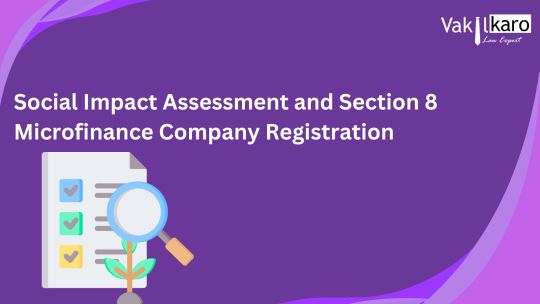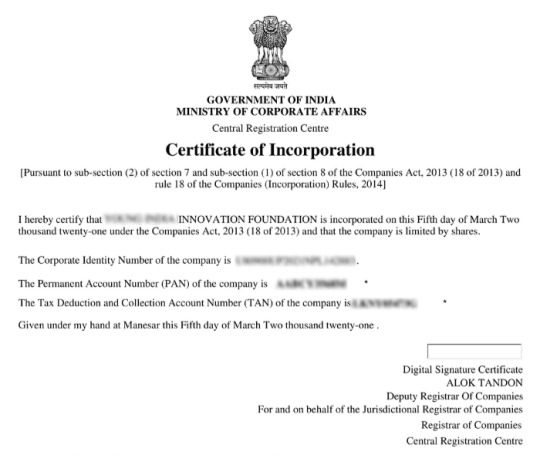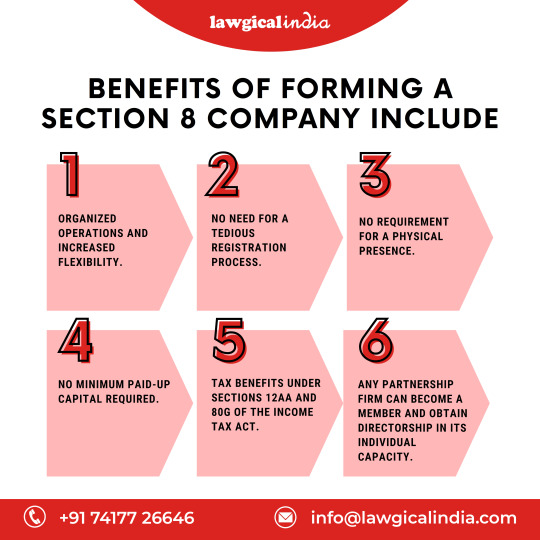#registration of section 8 company
Text

Social Impact Assessment is a critical process for evaluating the potential effects of a project or initiative on society. It helps identify both positive and negative consequences, ensuring socially responsible decision-making. In tandem, Section 8 Microfinance Company Registration refers to the legal incorporation of a non-profit microfinance institution under Section 8 of the Companies Act. This designation allows such entities to operate with the primary objective of promoting charitable activities, including microfinance services. Together, Social Impact Assessment and Section 8 Microfinance Company Registration play a pivotal role in fostering sustainable and inclusive financial solutions for marginalized communities. For more detailed information on Microfinance Company Registration and its legal implications. Read More
#section 8 company registration process#section 8 company#section 8 company registration procedure#registration of section 8 company#section 8 company registration#section 8 registration#hazard identification and risk assessment#microfinance company#what is microfinance#microfinance#social impact measurement#start a financial services company#impact investing#micro finance company#section 8#social impact#sec 8 company#non banking financial company
0 notes
Text
Section 8 Company Registration process in India

Section 8 Company Registration allows NGOs in India to function as non-profit organizations, Granting the ability to fundraise and offering tax benefits to support charitable initiatives. PSR compliance simplifies the process of registering a Section 8 company into just a few steps.
0 notes
Text
#charitable organizations#Companies Act#Digital Signature Certificate#limited liability#Ministry of Corporate Affairs#NGOs#non-profit organizations#Section 8 company registration online#tax exemptions
0 notes
Text
Required Forms for Section 8 Company and Its Purpose

Introduction:
Section 8 companies, also known as non-profit organizations, play a crucial role in promoting social welfare and charitable activities in India. Governed by the Companies Act, 2013, these entities are registered under Section 8 of the Act, which grants them certain privileges and exemptions. In this blog, we will explore the required forms for Section 8 companies and their purpose, shedding light on the process of establishment and compliance for these organizations.
Forms Required for Section 8 Company Registration:
Form INC-1:
Application for Reservation of Name
Purpose: This form is used to apply for the reservation of a name for the proposed Section 8 company. The name should reflect the objectives and activities of the organization and comply with the naming guidelines specified by the Ministry of Corporate Affairs (MCA).
Form INC-7: Application for Incorporation of Company
Purpose: Once the name is reserved, Form INC-7 is filed to incorporate the Section 8 company. This form includes details such as the proposed company name, registered office address, directors' information, and subscribers' details.
Form INC-12: Application for Grant of License under Section 8
Purpose: Section 8 companies require a license from the Central Government to operate as non-profit organizations. Form INC-12 is filed to apply for this license, providing details of the company's objectives, sources of income, and intended beneficiaries.
Form DIR-2: Consent to Act as Director
Purpose: Directors of the proposed Section 8 company are required to provide their consent to act as directors by filing Form DIR-2. This form includes details such as the director's name, address, and consent to act as a director of the company.
Form DIR-12: Particulars of Appointment of Directors and Key Managerial Personnel
Purpose: Once the directors' consent is obtained, Form DIR-12 is filed to notify the Registrar of Companies (ROC) regarding the appointment of directors and key managerial personnel of the Section 8 company.
Form INC-22: Notice of Situation or Change of Situation of Registered Office
Purpose: Section 8 companies are required to maintain a registered office address within India. Form INC-22 is filed to notify the ROC regarding the registered office address of the company or any changes therein.
Purpose of Required Forms:
These forms facilitate the process of establishing and registering a Section 8 company, ensuring compliance with the legal requirements specified under the Companies Act, 2013.
The forms provide a mechanism for disclosing relevant information to the authorities, such as the company's name, objectives, directors' details, and registered office address.
By filing these forms accurately and timely, Section 8 companies can obtain the necessary approvals and licenses to commence their operations as non-profit organizations, thereby contributing to social welfare and charitable activities in India.
Conclusion:
In conclusion, the required forms for Section 8 company registration serve a vital purpose in facilitating the establishment and compliance of non-profit organizations in India. By adhering to the prescribed procedures and filing these forms diligently, Section 8 companies can obtain the necessary approvals and licenses to carry out their charitable activities effectively and contribute positively to society. For more details efiletax.
#section 8 company#efiletax#Required Forms for Section 8 Company#business#section 8 company registration#taxes
0 notes
Text
Key Steps for the Registration of a Section 8 Company in Gurgaon
We have discussed 5 steps to for registration of a section 8 company in Gurgaon. You can follow this steps and get successful registration of section 8 company in Gurgaon.
0 notes
Text
Simplifying Business Registration in Kolkata: A Comprehensive Guide.

Navigating the maze of business registrations can be daunting, especially in a bustling city like Kolkata. From private limited companies to trademark registrations, here’s everything you need to know to establish your business successfully.
Starting a business in Kolkata or anywhere else requires navigating a series of legal procedures and registrations. Each step is crucial and contributes to the legitimacy and protection of your venture. In Kolkata, a city known for its entrepreneurial spirit, understanding the nuances of various business registrations is essential for smooth operations. Let's delve into the intricacies of different registrations you might need for your business in Kolkata.
Private Limited Company Registration: Registering your business as a private limited company offers several benefits, including limited liability protection and access to funding. In Kolkata, the process involves obtaining a Digital Signature Certificate (DSC), Director Identification Number (DIN), and filing the necessary documents with the Registrar of Companies (ROC). This registration is suitable for medium to large-scale businesses aiming for growth and expansion.
Business Registration: Kolkata offers various options for registering your business, including sole proprietorship, partnership, and limited liability partnership (LLP). Each structure has its own set of advantages and legal requirements. Sole proprietorship is the simplest form, while LLP combines the benefits of a partnership with limited liability protection. Understanding your business's needs and choosing the appropriate structure is crucial for long-term success.
Trademark Registration: Protecting your brand identity is paramount in today's competitive market. Trademark registration ensures exclusive rights to use your brand name, logo, or slogan, preventing others from using similar marks. In Kolkata, the process involves conducting a trademark search, filing an application with the Trademark Registry, and regular monitoring to safeguard your intellectual property.
LLP Registration: Limited Liability Partnership (LLP) is a popular choice for small to medium-sized businesses in Kolkata. It offers the flexibility of a partnership combined with limited liability protection for partners. The registration process includes obtaining a Digital Signature Certificate (DSC), Director Identification Number (DIN), and filing the incorporation documents with the Ministry of Corporate Affairs (MCA).
Nidhi Company Registration: Nidhi companies are non-banking financial institutions that facilitate mutual benefit among members. In Kolkata, registering a Nidhi company involves adhering to the strict regulations set by the Ministry of Corporate Affairs (MCA). The process includes drafting the memorandum and articles of association, obtaining approvals, and complying with ongoing compliance requirements.
Section 8 Company Registration: Section 8 companies, also known as not-for-profit organizations, are formed for promoting charitable activities, social welfare, or other nonprofit objectives. In Kolkata, registering a Section 8 company requires approval from the Central Government and adherence to specific regulations outlined in the Companies Act. This registration is ideal for entities focusing on social impact rather than profit generation.
Startup India Registration: Startup India initiative aims to foster innovation and entrepreneurship by providing various benefits and incentives to startups. Registering your startup under this scheme can unlock access to funding, tax exemptions, and other support services. In Kolkata, startups can register online through the Startup India portal by fulfilling the eligibility criteria and submitting the required documents.
Navigating the landscape of business registrations in Kolkata can be overwhelming, but with the right knowledge and guidance, it becomes more manageable. Whether you're establishing a private limited company, protecting your brand through trademark registration, or registering as a startup under the Startup India initiative, each step is crucial for the success and sustainability of your business. By understanding the requirements and adhering to the legal procedures, you can lay a strong foundation for your venture in the vibrant business ecosystem of Kolkata.
#Private limited company registration Kolkata#Pvt Ltd company registration Kolkata#Business registration Kolkata#Company registration Kolkata#Trade Mark Registration Kolkata#LLP Registration in Kolkata#LLP Company Registration in Kolkata#LLP Registration#Nidhi Registration Kolkata#Nidhi Company Registration in Kolkata#Section 8 Company Registration in Kolkata#Startup India Registration Kolkata#Startup Registration Process Kolkata#Sujata Associates
0 notes
Text
What is Section 8 Company? Documents, Procedure

A Section 8 Company is a type of nonprofit organization in India, regulated by the Companies Act. Its primary objective is to promote charitable or not-for-profit activities in areas like education, art, science, and social welfare. Unlike other companies, Section 8 companies do not distribute profits among their members and use any surplus for promoting their objectives.
Documents or Details Required for Section 8 Company Registration
To register a Section 8 Company in India, you typically need the following documents and details:
Memorandum of Association (MOA): This document outlines the company's objectives and the scope of its activities.
Articles of Association (AOA): This document defines the company's internal rules and regulations for management and administration.
Declaration by Directors: A declaration by each of the proposed directors stating that they have not been convicted or found guilty of any offense in connection with the promotion, formation, or management of any company.
Affidavits: Affidavits from the directors and subscribers declaring that they are not associated with any other Section 8 company with similar objects.
Address Proof: Address proof for the registered office of the company.
Identity Proof: Identity proof (PAN card) of all directors and subscribers.
Passport-sized Photographs: Passport-sized photographs of all directors and subscribers.
Utility Bills: Utility bills (electricity, water, etc.) or property tax receipt for the registered office address.
Approval from Appropriate Authority: If the proposed name contains any words that require approval from the central government or any authority, then the approval should be obtained.
Which types of Name can be used as the end of Section 8?
The name of a Section 8 Company in India should reflect its objectives and should not resemble the name of any existing company. The name should typically end with words like:
Foundation
Forum
Association
Federation
Chambers
Confederation
Council
Charities
Trust
Society
Organization
Institute
Is Trust, Society and Section 8 Company same?
Trusts, Societies, and Section 8 Companies are different legal entities commonly used for charitable or nonprofit activities in India:
Trust: A trust is a legal arrangement where a trustee holds and manages property for the benefit of beneficiaries. Trusts are governed by the Indian Trusts Act. They are often used for charitable and religious purposes.
Society: A society is formed under the Societies Registration Act. It is a membership-based organization that can be established for promoting literature, science, arts, education, charity, or any other useful purpose. Societies typically have a governing body and members.
Section 8 Company: A Section 8 Company, as per the Companies Act, is a nonprofit organization established for promoting commerce, art, science, sports, education, research, social welfare, religion, charity, protection of the environment, or any other charitable purpose. Unlike trusts and societies, it is a company incorporated under Section 8 of the Companies Act.
While all three serve similar purposes of promoting charitable or nonprofit activities, they differ in their legal structures, formation processes, and regulatory frameworks. The choice between a trust, society, or Section 8 Company depends on the specific requirements and preferences of the individuals or entities involved.
Procedure to Register Section 8 Company
The procedure to register a Section 8 Company in India involves several steps:
1. Name Approval:
Choose a unique and suitable name for the company that complies with naming guidelines.
Apply for name availability through the Ministry of Corporate Affairs (MCA) website.
2. Obtain Digital Signatures:
Obtain Digital Signature Certificates (DSC) for all proposed directors. This is required for online filing of documents.
3. Apply for Director Identification Number (DIN):
Directors need to apply for DIN if they don't have one. It can be obtained online from the MCA.
4. Drafting of Memorandum and Articles of Association:
Draft the Memorandum of Association (MOA) and Articles of Association (AOA) detailing the objectives and rules of the company.
5. Declaration by Directors and Subscribers:
Directors and subscribers need to sign a declaration stating that they have not been convicted or found guilty of any offense related to company management.
6. Application for License:
Prepare and file an application for a license under Section 8 with the Regional Director through the MCA.
7. Approval from Regional Director:
The Regional Director reviews the application and may request additional information. If satisfied, they grant the license.
8. Incorporation:
After obtaining the license, submit the incorporation documents including MOA, AOA, and other required details to the Registrar of Companies (RoC) for final incorporation.
9. Registered Office:
Provide proof of the registered office address.
10. Certificate of Incorporation:
Once the RoC verifies the documents, they issue the Certificate of Incorporation, officially establishing the Section 8 Company.
11. PAN and TAN Application:
Apply for the Permanent Account Number (PAN) and Tax Deduction and Collection Account Number (TAN) for the Section 8 Company.
Why should I register under section 8, because it is a company?
Registering under Section 8 provides certain advantages for organizations aiming to operate as nonprofit entities with charitable objectives. Here are some reasons why you might choose to register under Section 8:
Legal Recognition: Section 8 registration provides legal recognition to an organization as a nonprofit company. It is a separate legal entity, distinct from its members, which enhances credibility and legitimacy.
Limited Liability: Members of a Section 8 Company have limited liability. This means their personal assets are generally protected from the company's liabilities.
Perpetual Succession: A Section 8 Company enjoys perpetual succession, meaning its existence is not affected by changes in its membership. It continues to exist until it achieves its objectives or is dissolved according to legal provisions.
Tax Exemptions: Section 8 Companies may be eligible for tax exemptions under the Income Tax Act, making it more attractive for donors and contributors.
Fundraising Opportunities: Being a legal entity, Section 8 Companies can easily raise funds through donations, grants, and other fundraising activities to support their charitable purposes.
Greater Credibility: Registration under Section 8 enhances the credibility of the organization, as it is subjected to regulatory oversight and compliance requirements.
Access to Grants and Funding: Many government and non-government organizations prefer to provide grants and funding to registered nonprofit entities, and Section 8 registration facilitates access to such opportunities.
Limited Profit Distribution: Unlike regular companies, Section 8 Companies are restricted in distributing profits to their members. Any surplus generated is utilized for promoting the company's charitable objectives.
How Vakilkaro helps for Section 8 Company Registration?
Expert Guidance: Vakilkaro provides expert legal guidance throughout the Section 8 Company registration process, ensuring accurate documentation and compliance with regulatory requirements.
Efficient Name Approval: Vakilkaro streamlines the name approval process by assisting in the selection of a unique and compliant name, expediting the initial stage of registration.
Online Document Filing: Vakilkaro facilitates the efficient online filing of essential documents, including Memorandum and Articles of Association, Director Identification Number (DIN) application, and more.
License Application Support: Vakilkaro assists in the preparation and filing of the license application under Section 8, navigating the complexities of the approval process with the Regional Director.
Comprehensive Service: From start to finish, Vakilkaro offers end-to-end support, ensuring a smooth and hassle-free Section 8 Company registration experience, allowing clients to focus on their charitable objectives.
#microfinance company#section 8 microfinance company#company registration#section 8 company registration process
0 notes
Text
Unveiling the Benefits and Process of Section 8 Registration

In the realm of social entrepreneurship and nonprofit ventures, Section 8 registration holds immense significance. This legal provision enables organizations to operate for charitable purposes without the objective of earning profits. In this article, we will explore the benefits and process of Section 8 registration, shedding light on how LegalPillers can streamline this journey for aspiring entrepreuneurs and changemakers.
Benefits of Section 8 Registration
Tax Exemption: Section 8 companies enjoy tax benefits, making it an attractive option for those focused on social welfare rather than profit generation.
Limited Liability: Similar to private limited companies, Section 8 entities offer limited liability protection to their members, safeguarding personal assets from business liabilities.
Enhanced Credibility: Being registered under Section 8 adds credibility to an organization's mission, enhancing its reputation among stakeholders and potential donors.
Access to Funding: Section 8 companies are eligible for grants and donations from various government and non-government organizations, facilitating financial sustainability.
Social Impact: The primary advantage of Section 8 registration is the opportunity to make a positive impact on society by addressing pressing issues through structured initiatives and projects.
Process of Section 8 Registration
Pre-Incorporation Steps: The process begins with selecting suitable directors and applying for Digital Signature Certificates (DSC) and Director Identification Numbers (DIN).
Name Approval: Next, the proposed name of the company is submitted to the Registrar of Companies (ROC) for approval. It must comply with the naming guidelines prescribed by the Ministry of Corporate Affairs.
Memorandum and Articles of Association: A Memorandum of Association (MOA) and Articles of Association (AOA) outlining the objectives and rules of the company are drafted and filed with the ROC.
Application Submission: Once the necessary documents are prepared, the application for Section 8 registration, along with the prescribed fees, is submitted to the ROC.
Registration Approval: Upon successful verification of the application and compliance with regulatory requirements, the ROC issues the Certificate of Incorporation, officially recognizing the organization as a Section 8 company.
Conclusion
Navigating the complexities of Section 8 registration can be difficult, but LegalPillers is here to simplify the process. With our expertise and dedication, we ensure a smooth journey from inception to incorporation, allowing you to focus on making a difference in the world. Trust LegalPillers to be your guiding light in realizing your philanthropic aspirations through Section 8 registration.
#Section 8 Registration#Section 8 Company#Section 8 Registration India#Section 8 Registration Online
0 notes
Text
Empowering Change Through Section 8 company Registration

In the realm of non-profit organizations dedicated to social causes, Section 8 Company Registration holds profound importance. It's not just a legal formality; it's a commitment to creating positive change. Section 8 Company Registration signifies that your organization operates within the legal framework, showcasing its commitment to transparency and compliance with regulatory standards. Whether your mission is education, healthcare, or environmental conservation, Section 8 Company Registration is a pivotal step in establishing your organization's credibility.
Corpbiz Section 8 Company Registration Services: Nurturing Your Noble Cause
Corpbiz specializes in providing expert assistance in Section 8 Company Registration, tailored to your organization's unique needs. Our team of professionals possesses in-depth knowledge of the intricacies surrounding non-profit registration, understanding the significance of this process.
We take a comprehensive approach to Section 8 Company Registration, ensuring that your organization not only meets its legal obligations but also establishes a well-structured foundation for credibility. Our Registration services are designed to save you valuable time and effort, allowing you to focus on your organization's mission while we handle the legal intricacies.
Why Choose Corpbiz for Section 8 Company Registration
Expert Guidance: We ensure that your Section 8 Company Registration is in compliance with all applicable laws and regulations.
Efficiency: We streamline the registration process, making it hassle-free.
Impactful Registration: We help you establish a Section 8 Company structure that enhances your organization's credibility and impact.
Don't underestimate the power of Section 8 Company Registration. Trust Corpbiz to help your organization achieve efficient registration while ensuring credibility and compliance. We are committed to ensuring that your organization not only meets its legal obligations but also thrives with a well-structured and credible foundation.
Contact us today to learn how our expertise can inspire change through expert Section 8 Company Registration services. Let us be your trusted partner in making a lasting impact on society, upholding the highest standards of legality and ethical business practices.
#Section 8 Company Registration#Company Registration services#Section 8 Company#Company Registration
0 notes
Text
Online NGO Registration - Types, Procedure, Fees, Documents Required
Establishing a Non-Government Organization (NGO) helps you work for the betterment and improvement of society. To register an NGO, you need to understand what they are, how they work, and the registration requirements. There are three forms of NGO - Section 8 company, Society, and Trust.
In effect from April 1, 2021, all NGOs need to file Form CSR-1 to register with Central Government to get CSR funding. Furthermore, FCRA registration is required if the NGO is seeking funds from foreign sources.
A non-governmental organization (NGO) is a non-profit organization established by a group of natural persons for charitable and social purposes.
Types of NGO Registration:
Section 8 Company Registration under the Companies Act, 2013
Trust Registration under the Trust Act, 1882
Society Registration under the Societies Registration Act, 1860
NGO Registration fees:
The total cost of registering a section 8 company, including government and professional fees, would be Rs. 4,999
The total cost of trust registration, including government and professional fees, would be Rs. 13,999
The total cost of society registration, including government and professional fees, would be Rs. 12,999
To know more (click here)

#business#india#startup#manage business#business growth#partnership firm registration#ngo#ngoindia#ngo in noida#ngo donation#ngo registration#ngo for children#ngo in india#private limited company registration in chennai#section 8 registration#section 8 microfinance company registratioin#section 8 company in india
0 notes
Text
What is difference between NBFC and bank?

Non-Banking Financial Companies (NBFCs) and banks both play vital roles in the financial system, but there are some key differences between them:
Regulation: NBFCs are regulated by the Reserve Bank of India (RBI) under the Reserve Bank of India Act, 1934. However, their regulations are not as stringent as those for banks. Banks are regulated under the Banking Regulation Act, 1949, and are subject to more extensive regulatory requirements due to their role in the monetary system and their ability to create money through lending.
Acceptance of Deposits: Banks are authorized to accept demand deposits, whereas NBFCs cannot accept demand deposits. NBFCs primarily raise funds through other means such as issue of debentures, bonds, or loans from banks and financial institutions.
Lending Activities: Both banks and NBFCs engage in lending activities, but banks are more focused on providing loans to various sectors of the economy, including retail and corporate sectors. NBFCs, on the other hand, may specialize in certain types of lending such as consumer finance, housing finance, or infrastructure finance.
Access to Payment Systems: Banks have access to payment and settlement systems such as RTGS (Real Time Gross Settlement) and NEFT (National Electronic Funds Transfer) which NBFCs typically do not have access to. This enables banks to facilitate payments and settlements on behalf of their customers.
Deposit Insurance: Banks provide deposit insurance to their depositors through schemes like the Deposit Insurance and Credit Guarantee Corporation (DICGC) in India, which guarantees repayment of deposits up to a certain limit in case of bank failure. NBFCs do not provide this kind of deposit insurance.
Role in Monetary Policy Transmission: Banks play a crucial role in the transmission of monetary policy set by the central bank. Changes in the policy rates by the RBI affect the lending and deposit rates of banks, which in turn influence economic activities. NBFCs do not have the same direct influence on monetary policy transmission.
Ownership: While banks can be privately owned or government-owned, NBFCs are usually privately owned.
Overall, while both banks and NBFCs are important components of the financial system, banks have a more extensive regulatory framework and offer a wider range of services compared to NBFCs.
Choose Vakilkaro for NBFC registration in Lakhimpur Kheri
Looking to register your NBFC in Lakhimpur Kheri? So choose Vakilkaro, your trusted partner. With expert guidance and seamless service, Vakilkaro's team makes NBFC registration hassle-free. Ensure compliance and legal clarity with our dedicated team. Trust Vakilkaro for a smooth NBFC registration journey in Lakhimpur Kheri. And contact Vakilkaro's team on this number: 9828123489.
#nbfc registration#nbfc registration process#microfinance registration#nbfc registration fees#microfinance registration process#nbfc company registration#nbfc registration procedure#nbfc registration consultant#12a & 80g registration#microfinance registration process in hindi#80g certificate registration#section 8 company registration#company registration#nbfc registration form#non banking financial company registration#microfinance company registration process
0 notes
Text
Best Sevction-8 Company registration Certificate provider in India
Are You Looking for Section 8 company Registration Certificate in India? Now you can Register Your Company Under Section 8 with Easy process that saves you time and effort, allowing you to focus on other aspects of your business. Visit our Website for more information.
0 notes
Text

A company is alluded to as a “Section 8” company when it is enlisted as a non-profit organization (NPO)/NGO, i.e., when it has the thought process of advancing expressions, commerce, instruction, charity, security of the environment, sports, science, inquire about, social welfare, and religion. The pay of an NPO cannot be utilized for paying out profits to the company’s individuals and has to be for the advancement of charitable goals. Such companies get a joining certificate from the central government and are at risk to follow to the rules indicated by the government.
#section 8 comany registration#section 8 company registration in online. section 8 company registration online in india#section 8 company registration process.
0 notes
Text
What are the Stages of Incorporation of a Company?

The process of incorporating a company typically involves several stages, which may vary depending on the jurisdiction and the type of company being formed. Here are the general stages involved in the incorporation process:
Business Planning: Before incorporating, it's essential to have a clear business plan outlining your company's goals, objectives, target market, products or services, and financial projections.
Choose a Business Structure: Decide on the most suitable legal structure for your company, such as a sole proprietorship, partnership, limited liability company (LLC), or corporation. Consider factors such as liability protection, taxation, and operational flexibility.
Choose a Business Name: Select a unique and available name for your company that complies with local naming regulations. Conduct a name search to ensure that the name you've chosen is not already in use by another business.
Draft and File Articles of Incorporation: Prepare the necessary legal documents, such as articles of incorporation (also known as a certificate of incorporation or charter), which outline the company's name, purpose, location, share structure, and other key details. File these documents with the appropriate government agency or registrar.
Appoint Directors and Officers: Nominate individuals to serve as directors and officers of the company. Directors are responsible for overseeing the company's affairs and making strategic decisions, while officers handle day-to-day operations.
Issue Shares: If forming a corporation, allocate and issue shares of stock to the company's shareholders in accordance with the articles of incorporation and applicable laws.
Obtain Necessary Licenses and Permits: Depending on the nature of your business activities, you may need to obtain specific licenses, permits, or regulatory approvals to operate legally. Research the requirements in your industry and jurisdiction and apply for any necessary permits.
Register for Taxes: Register your company for taxes and obtain a tax identification number (TIN) or employer identification number (EIN) from the appropriate tax authorities.
Create Corporate Bylaws: Draft corporate bylaws, which are internal rules and procedures governing the operation of the company. Bylaws typically cover matters such as shareholder meetings, director elections, and corporate governance.
Open a Business Bank Account: Establish a separate bank account for your company to manage its finances and transactions. Most banks require proof of company registration and identification documents to open a business account.
Comply with Ongoing Requirements: Once your company is incorporated, ensure that you comply with all ongoing legal and regulatory requirements, such as filing annual reports, paying taxes, holding shareholder meetings, and maintaining corporate records.
These are the general stages involved in the incorporation process, but the specific steps and requirements may vary depending on the jurisdiction and the type of company being formed. It's essential to consult with legal and financial professionals to ensure that you complete the incorporation process correctly and comply with all applicable laws and regulations.
#efiletax#business#Stages of Incorporation#Incorporation of a Company#company registration#section 8 company#private company#gst services#taxes#gst
0 notes
Photo

Benefits of forming a section 8 company include
0 notes